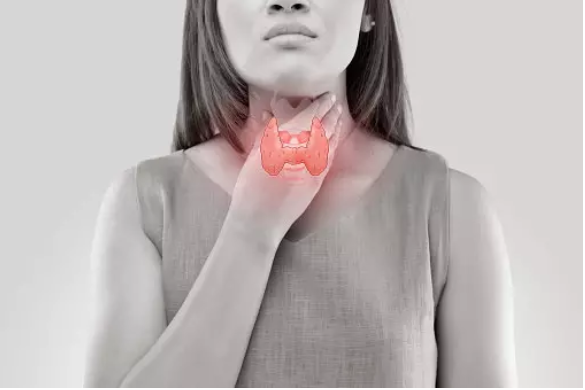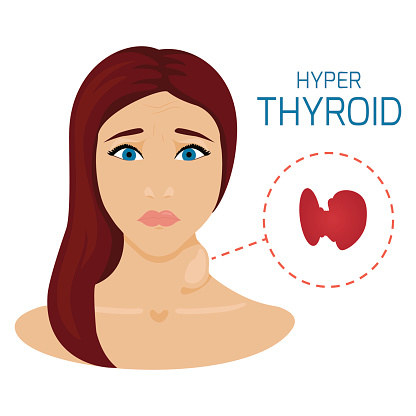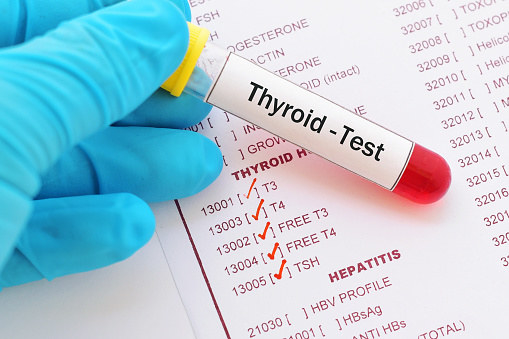 |
| Advertisement |
Graves’ disease causes symptoms like irritability, period abnormalities, fatigue, and a racing heartbeat.
This week, talk show host Wendy Williams announced that she has Graves’ disease.
Graves’ affects the thyroid, a butterfly-shaped gland in the front of the neck.

Graves’ is a bit unusual because, instead of destroying tissue like other autoimmune diseases, people with Graves’ have abnormal antibodies that stimulate the thyroid to make way too much hormone.
Because the thyroid helps control metabolism and a bunch of other things, this condition — known as hyperthyroidism — can affect many different parts of the body.
About 1 in 200 people have Graves’ disease, or 10 million people in the US. It’s usually diagnosed in people between the ages of 30 and 50, and is 7 to 8 times more common in women than men. But it can happen at any age, and just because more women get it doesn’t mean men can’t.
Tharakorn / Getty Images
And despite the name, the disease has nothing to do with actual graves.

It’s named after an Irish physician named Robert Graves, who discovered it about 150 years ago.
Giphy / Via giphy.com
There are A LOT of different symptoms, including anxiety and sweating.

This condition can cause a bunch of symptoms that could be mistaken for other problems, including anxiety, irritability, abnormal periods, increased sweating, tremors, and more.
“The dominant symptoms can be a racing heartbeat, increased perspiration, diarrhea, increased anxiety, weight loss, and heat intolerance,” says Smith, who is also a professor of internal medicine at the University of Michigan Medical School in Ann Arbor. “People often feel hot when others around them are comfortable or even cold.”
Other symptoms are shortness of breath, muscle weakness, fatigue, high blood pressure, difficulty sleeping, and chest pain. Eye problems can also be an issue, such as tearing, light sensitivity, and swelling and inflammation of the eyes causing redness, double vision, pain, and a gritty feeling.
Giphy / Via giphy.com
Williams fainted on her show in November, and it may have been related to her diagnosis.
At the time, she attributed the episode to dehydration, and some people even doubted it was real.
"A lot of people thought that was a joke — me fainting on my set. No, that was not a joke," she said on her show. "I’m a tall woman and it’s a long way down. I’m also a woman of a particular age and I’m not trying to break anything, and also I don’t do stunts and jokes for you like that. I don’t need that."
The combination of symptoms, like heat sensitivity, excess perspiration leading to a loss of fluids, plus a racing heart, could lead to fainting, Smith said, although he hasn't treated Williams.
Instagram: @missymisdemeanorelliott
Tremors are a common symptom for people with Graves' disease, says Smith. “One of those things that I look for in the physical examination is tremors,” he said.
The good news is that, since then, Missy Elliott has said she is doing well and is managing the disease.
Some people have more severe symptoms, like eye protrusion and neck swelling.

Sometimes people with Graves’ disease can have protruding eyes, called exophthalmos; goiter, which is an enlargement of the neck that can cause coughing and make swallowing difficult; and a reddening of the skin on the feet or shins, which is relatively rare and called pretibial myxedema.
Nauma / Getty Images
In 2010, Sia tweeted about radiation treatment for the condition. This is one of the most common treatments for Graves', but there are others.
Most often people start by taking anti-thyroid medications, “which control the thyroid overactivity, but don’t cure the disease, in that when the medication is stopped most people revert to hyperthyroidism,” says Smith.
The “definitive therapies,” including radioactive iodine ablation or surgical thyroidectomy, involve removing or shrinking overactive tissue, Smith said.
For example, in radioactive iodine therapy, patients are treated with radiation-tagged iodine molecules, which selectively target and kill overactive cells in the thyroid.
And getting treatment is really important.

In rare cases, untreated Graves’ disease can trigger a potentially life-threatening situation called a thyroid storm, also known as thyrotoxicosis, which can lead to organ failure. “Lots of untoward things can happen to people who are severely, what we call, thyrotoxic,” says Smith.
But usually people get treatment long before something like that could happen.
“Luckily most people with Graves’ disease are diagnosed and treated effectively and are never in danger of anything more serious than needing to take medication or undergoing definitive therapy,” Smith says. But in rare instances where people skip medication or don’t have access to good medical care, the thyroid overactivity can cause serious heart issues, Smith says.
Chesiirecat / Getty Images
A blood test can catch thyroid problems before you even have symptoms.

No one is really sure what causes Graves’ disease, although it can run in families. People who may be at higher risk are smokers, people with other autoimmune conditions, and people who are pregnant, have been pregnant, or are under physical or emotional stress.
Smith says that he often recommends that women get a blood test to check for thyroid problems — a relatively inexpensive test that's especially important if you have a family history of the disease. “I recommend that every year or so they undergo what we call a TSH blood test, which can be very revealing and can identify the diagnosis even before there are any symptoms,” he says. TSH stands for thyroid-stimulating hormone.
“It’s one of the more cost-effective ways of screening a large population for not only thyroid overactivity but underactivity,” Smith says.
While a blood test won't prevent Graves' disease, it can detect the problem more quickly and lead to earlier treatment.
Jarun011 / Getty Images
But Graves' can sometimes take a while to diagnose.

Because the thyroid regulates so many bodily processes, the symptoms are incredibly varied, which can make it easy to mistake for other problems.
"There are many things that can cause one or two of these symptoms,” says Smith.
However, when you consider them all together, doctors should be able to make the correct call, he said.
Friday the 13th / Via giphy.com
You can read more about what it's really like to have Graves' disease here.

Marcos Chamizo / BuzzFeed


0 comments: